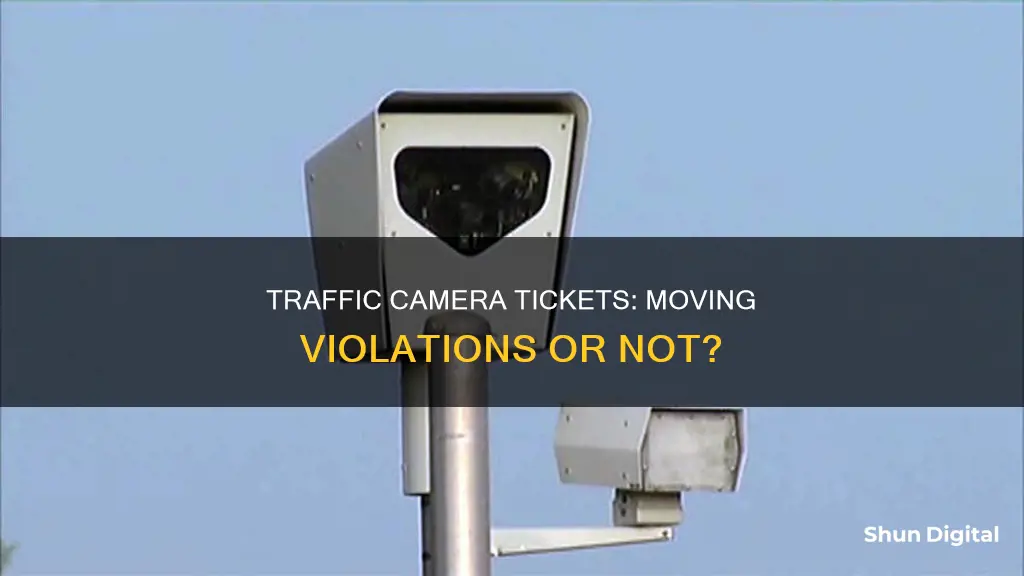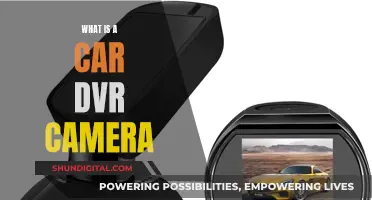
Traffic camera tickets are generally treated as non-moving violations, similar to parking tickets, tickets for expired registration, or broken tail lights. These tickets are considered civil or administrative violations, resulting in a fine but no points on your driver's license or driving record. However, there are exceptions in certain states like Arizona, California, and Oregon, where red light camera tickets are treated as moving violations, leading to points and potential insurance increases. It's important to be aware of the specific laws and regulations in your state regarding traffic camera tickets and their consequences.
| Characteristics | Values |
|---|---|
| Are traffic camera tickets considered moving violations? | In most states, traffic camera tickets are not considered moving violations. They are treated as non-moving violations, like parking tickets. |
| Do traffic camera tickets result in points on your license? | In most cases, traffic camera tickets do not result in points on your license. However, there may be exceptions in certain states or jurisdictions. |
| Do traffic camera tickets affect insurance rates? | Traffic camera tickets do not typically increase insurance rates. However, if the ticket puts points on your license or is added to your driving record, it may impact your insurance rates. |
| Do traffic camera tickets go on your driving record? | Traffic camera tickets may or may not be added to your driving record, depending on the state or jurisdiction. Some states treat them as non-moving violations, which are usually not included in the driving record. |
| Can you fight a traffic camera ticket? | Yes, it is possible to dispute or fight a traffic camera ticket. This may involve providing evidence or arguing that the camera footage is insufficient to prove the violation. |
What You'll Learn

Camera tickets are treated like non-moving violations in most states
Camera tickets are generally treated as non-moving violations in most states, which means they are similar to parking tickets or tickets for expired registration. These tickets are considered civil citations, and while they may result in a fine, they typically do not add points to your driver's license or affect your driving record. This is because automated enforcement citations are usually classified as civil or administrative violations, rather than criminal ones.
However, it is important to note that there are exceptions. For example, in Arizona, California, and Oregon, red light camera tickets are considered moving violations and can result in points on your license. Additionally, the impact of camera tickets on insurance rates may vary depending on the state and the insurance company. While in most states, camera tickets do not increase insurance rates, it is always a good idea to check with your specific insurance provider to understand their policies.
The process of receiving a camera ticket typically involves a review of the camera footage by a police officer, who makes the final decision on whether to issue a citation. The ticket is then mailed to the registered owner of the vehicle, who has the opportunity to respond and, in some cases, dispute the ticket if they were not the driver.
It is worth noting that camera tickets are not the same as traditional traffic citations issued by a police officer. The penalties for camera tickets are usually less severe, with fines typically being $100 or less. Additionally, in most states, these tickets do not result in demerit points being added to the offender's driving record.
While camera tickets may not carry the same weight as traditional moving violations, it is still important to abide by traffic laws and regulations to ensure the safety of everyone on the road.
The Evolution of Retina Eye Camera Technology
You may want to see also

Camera tickets are treated like moving violations in some states
In most states, camera tickets are treated as non-moving violations, similar to parking tickets, expired registration, or a broken taillight. This means that they do not result in any points on your license or increases in insurance rates. However, they may still need to be paid, and in some cases, they can appear on your driving record.
The specific consequences of a camera ticket depend on the state in which the violation occurred. For example, in Arizona, California, and Oregon, red light camera tickets are considered moving violations, while in other states, they are not. In Washington, D.C., a ticket from a traffic camera is classified as a moving violation, but it does not result in points on your license or license suspension for non-payment. On the other hand, in Montgomery County and Prince George's County in Maryland, speed camera tickets are treated as civil violations, like parking tickets, and do not result in points on your license.
It's important to note that even within the same state, the consequences of a camera ticket may vary depending on the specific location and the type of violation. For instance, while red light camera tickets in California are considered moving violations, speed camera tickets in the state are prohibited.
To understand the specific implications of a camera ticket, it is advisable to review the laws and regulations of the state and local jurisdiction where the ticket was issued.
Do Traffic Cameras Affect Your Driving Record?
You may want to see also

Camera tickets are mailed to the vehicle owner
Camera tickets are generally treated as civil or administrative violations, and are sent via mail to the registered owner of the vehicle. They are not considered moving violations and do not result in points being added to your driver's license. In most states, they are treated like non-moving violations, such as parking tickets, or tickets for an expired registration.
The procedures for camera tickets vary by jurisdiction, but typically, a police officer reviews the photos and videos and decides whether to issue a ticket. The registered owner of the vehicle then receives the citation within ten to 90 days, and has a period of time, usually 30 days, to respond.
In some states, such as New York, red-light camera tickets are treated like parking violations, and the registered owner of the vehicle is held liable. In other states, such as Texas, red-light cameras are allowed, but speed cameras are prohibited.
It's important to note that there are exceptions to the rule. For example, in Arizona, California, and Oregon, camera tickets are considered moving violations and can result in points on your license and increases in your insurance rates. Additionally, if your employer has general liability insurance, multiple camera tickets may affect their insurance rates and could be the reason why you were denied a job.
If you receive a camera ticket, you have the option to dispute it. You can examine the ticket details, including the date, time, location, and code section of the violation. You can also review the photos and videos of the alleged violation and check if there is clear evidence of your vehicle and license plate. If you were not the driver at the time of the violation, you may be able to provide an affidavit stating the name and address of the person who was driving.
Do Arizona Police Cars Have Cameras?
You may want to see also

Camera tickets are reviewed by a police officer
Camera tickets are generally considered civil or non-moving violations, which are similar to parking tickets. They do not result in points on your license or driving record, and they will not cause your insurance rates to increase. However, there are a few exceptions. In the US, only three states—Arizona, California, and Oregon—treat red light camera tickets as moving violations. In these states, a camera ticket may result in points on your license and increased insurance rates.
Now, regarding the review process for camera tickets, it is important to note that they are typically reviewed by a police officer or a designated authority. While the specific procedures may vary depending on the jurisdiction, here is an overview of how the process generally works:
- Evidence Collection: When a traffic camera captures a potential violation, the footage or images are sent to the relevant law enforcement agency or a specialized team responsible for reviewing such cases. This team may be part of the police department or a separate entity, depending on the region's protocols.
- Initial Review: A police officer or authorized personnel will review the footage or images to determine if a violation has occurred. They will look for clear evidence, such as the vehicle's speed, running a red light, or other infractions.
- Validation and Verification: The reviewing officer will validate the evidence to ensure it meets the required standards. This may include checking the calibration and functionality of the camera, verifying the date and time stamps, and ensuring that the vehicle's license plate is clearly visible.
- Approval and Issuance: If the evidence is valid and the violation is confirmed, the reviewing officer will approve the issuance of a ticket. The ticket will typically include relevant details, such as the date, time, location, and nature of the violation.
- Notification and Payment: The ticket will then be sent to the registered owner of the vehicle. In some cases, this may be done via mail, while other jurisdictions may use electronic means, such as email or text message notifications. The recipient of the ticket will be required to pay the associated fine.
- Dispute Resolution: If the recipient of the ticket wishes to dispute the violation, they can usually do so by following the outlined procedures. This may involve requesting additional evidence, providing their own evidence, or attending a hearing to present their case.
It is important to note that the review process aims to ensure fairness and accuracy in the issuance of camera tickets. The involvement of a police officer or authorized personnel helps maintain the integrity of the system and provides an opportunity for further investigation or clarification if needed.
Are Camera Speeding Tickets Worth Contesting in Court?
You may want to see also

Camera tickets can be fought
In most states, camera tickets are treated as non-moving violations, similar to parking tickets, tickets for expired registration, or broken tail lights. This means they do not go on your driving record, and you won't get points on your license. However, there are a few exceptions, such as in Oregon, Arizona, California, and Washington D.C., where camera tickets are treated as moving violations.
If you receive a camera ticket, you may be able to fight it. Here are some ways to do so:
- Review the evidence: Obtain the photo or video footage of the alleged violation. If it does not clearly show your vehicle, license plate, or the violation itself, you may have grounds for dismissal.
- Provide a reason for breaking the law: If you had a valid reason for speeding or running a red light, such as an emergency or giving way to an emergency vehicle, explain this to the judge. This may lead to the ticket being dismissed.
- Identify technical defects: If the ticket contains inaccurate or incomplete information, such as empty fields, incorrect dates or times, or a missing photo, it may be dismissed.
- Challenge the calibration of the camera: If you can prove that the camera was not properly calibrated or was malfunctioning, the evidence it produced may be deemed inadmissible in court.
- Prove mistaken identity: If you were not the driver at the time of the violation, you can complete an Affidavit of Non-Responsibility and provide documentation to support your claim.
- Hire an attorney: Consult a traffic lawyer who can review your case and provide guidance on the best course of action. They can also represent you in court and improve your chances of a successful outcome.
It's important to note that fighting a camera ticket may involve going through the official court process, which can be intimidating and time-consuming. However, with proper research and legal assistance, it is possible to successfully contest these tickets.
Louisiana Camera Tickets: Do You Have to Pay?
You may want to see also
Frequently asked questions
In most states, traffic camera tickets are treated like non-moving violations, similar to parking tickets. However, a few states, including Oregon, Arizona, California, and Washington D.C., consider them moving violations.
Traffic camera tickets generally do not go on your driving record and do not affect insurance rates. However, in certain states, like Arizona, California, and Oregon, these tickets can result in points on your license and higher insurance rates.
The consequences of not paying a traffic camera ticket vary. In some jurisdictions, like Washington D.C., your license won't be suspended, but in others, like Seattle, unpaid tickets can cause a hold to be placed on your vehicle registration.







